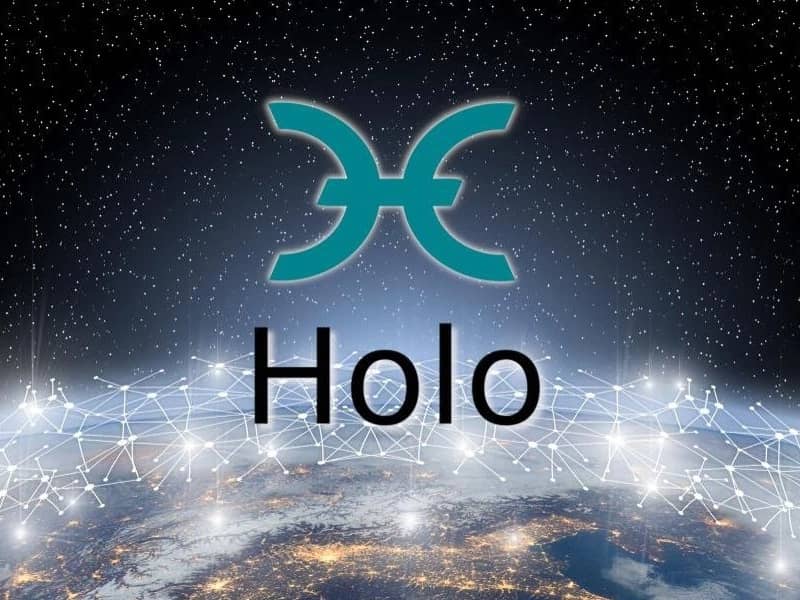订阅 wiki
Share wiki
Bookmark
Holo (HOT)
0%
Holo (HOT)
Holo (HOT) 是一种在 Holo 生态系统中运行的加密货币,用于促进交易,并在 HoloFuel 完全实施之前充当中间媒介。Holo 提供了一个去中心化的托管网络,使基于 Holochain 的应用程序可以通过传统的 Web 浏览器访问。Holochain 是一个点对点 (P2P)框架,用于去中心化应用程序 (DApp)开发,它与区块链的不同之处在于,它采用以代理为中心的模型,旨在提高可扩展性和效率。 [1] [2]
概述
Holo 作为一个中间层,允许访问 Holochain 应用程序,而无需用户安装额外的软件。区块链通过分布式托管模型运行,参与者贡献闲置的计算资源来支持基于 Holochain 的应用程序。这种去中心化的架构增强了分布式应用程序的可扩展性和可访问性。 [2]
历史
Holo 由 Arthur Brock 和 Eric Harris-Braun 于 2016 年创立,是 MetaCurrency 项目的一部分,该项目是一项更广泛的专注于点对点经济工具的倡议。该项目的基础受到 Ceptr 的影响,Ceptr 是创始人之前开发的合作 P2P 框架。Holo 的 首次社区发行 (ICO) 于 2018 年举行,发行了 HOT 代币,作为过渡到 HoloFuel 之前的临时交换机制。
自成立以来,Holo 经历了各种开发阶段,包括发布 HoloPorts,这是一种专为托管 Holochain 应用程序而设计的专用硬件。该项目还对其生态系统和货币模型进行了 alpha 和 beta 测试,以便在全面实施之前完善其基础设施。
技术
Holo 的基础设施依赖于分布式云托管框架,参与者(称为主机)分配计算能力和存储空间以换取 HoloFuel。该平台采用验证分布式哈希表 (DHT),允许每个节点在本地强制执行数据验证规则。与需要所有节点维护全局账本的区块链不同,Holochain 使节点仅存储网络数据的一部分,从而减少了计算开销并提高了效率。 [2]
Holochain 架构
Holochain 与基于区块链的架构不同,因为它消除了对全局共识机制的需求。它使每个节点能够验证和管理自己的数据,同时通过加密签名和对等验证来维护整体网络完整性。基于 Holochain 的应用程序促进了去中心化的数据所有权,减少了对中心化实体的依赖。
该架构由三个主要组件组成:
- 以代理为中心的模型:与区块链以数据为中心的方法不同,Holochain 中的每个节点(代理)都维护一个个人不可变的链,同时仅存储必要的数据并与网络共享。
- 验证分布式哈希表 (DHT):节点根据其本地验证规则验证交易和交互,并通过 DHT 而不是单个共享账本传播信息。
- 点对点治理:该协议允许在较小的网络中进行自我监管和验证,从而减少了对单个中央机构的依赖。
HoloFuel & HOT
HoloFuel 是 Holo 网络的本地加密货币,并作为一种互助信用系统运行,专为高频微交易而设计。
它在几个方面与 HOT 不同:
- 会计模型:与作为 ERC-20 代币的 HOT 不同,HoloFuel 作为一个资产支持的会计系统运行,该系统根据网络使用情况动态扩展。
- 稳定性:HoloFuel 的价值由托管能力决定,而不是投机,旨在实现更高的价格稳定性。 Holo 的代币 HOT 可在多个加密货币交易所上使用,包括 Binance 和 Probit。HOT 充当 HoloFuel 的占位符,并将在完全网络实施后逐步淘汰。 [5] [6] [7]
治理和社区
Holo 遵循开源治理模型,允许社区成员和开发人员为项目做出贡献。虽然最初的开发由 Holo Ltd. 领导,但该项目旨在过渡到更去中心化的治理,如 DAO 框架。未来的治理机制可能包括社区驱动的决策和自动化监管框架的组合。
安全性和数据完整性
Holochain 采用加密签名和分布式验证机制来维护数据完整性。每个应用程序都建立自己的验证规则,并且数据在区块链中分发之前由对等方验证。此模型减少了对集中式数据存储的依赖,并消除了对全局共识协议的需求。
Holochain 在几个关键领域与区块链不同:
- 共识机制:Holochain 不需要全局共识,而区块链依赖于工作量证明 (PoW) 或权益证明 (PoS) 机制。
- 可扩展性:Holochain 通过分片将数据分布在节点上,从而减少了对完整账本同步的需求,这是区块链系统中的一个限制。
- 能源消耗:与通常需要大量能源用于挖矿操作的区块链不同,Holochain 以较低的计算成本运行。
- 计算效率:Holochain 以代理为中心的方法支持本地化验证,旨在使交易比基于区块链的系统更有效。
Holochain 的用例
Holochain 支持各种去中心化应用程序,包括:
- 社交网络:在没有集中控制的情况下运行的平台,允许用户保留对其数据的所有权。
- 供应链管理:促进多个实体之间共享数据访问的系统,以提高效率和透明度。
- 点对点市场:支持用户之间直接交易而无需中介的去中心化平台。
- 治理和决策:促进去中心化治理模型的协作框架。
- 协作工具:在没有集中监督的情况下运行的应用程序,例如维基、日程安排工具和讨论论坛。
未来发展
Holo 的未来发展包括几个关键里程碑:
发现错误了吗?
